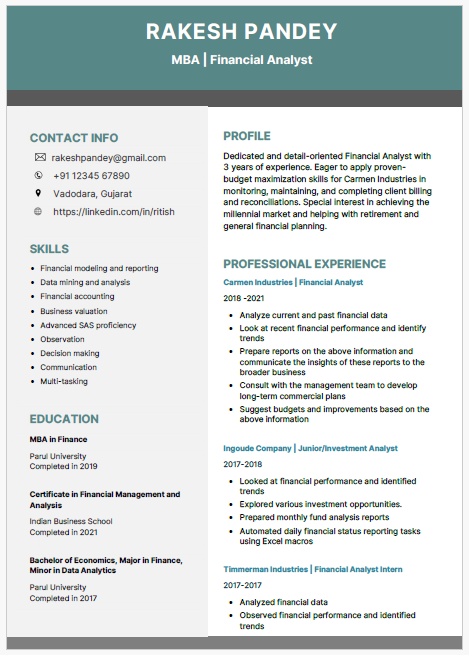Financial Analyst
MBA

About this template
This is a very simple and professional resume which can effectively highlight your skills and experiences in a clear and concise manner.
This resume is made by MS Word, featuring a clean and modern layout designed to highlight your skills and achievements.
Some important and useful soft skills for MBA, Financial Analyst
For an MBA graduate working as a Financial Analyst, soft skills are crucial in complementing technical expertise and contributing to successful financial decision-making. Here are ten important and useful soft skills for a Financial Analyst:
1. Analytical Thinking:
Analytical thinking involves breaking down complex data and financial information to identify trends, make predictions, and support decision-making. Financial Analysts must be adept at analyzing quantitative and qualitative data to provide actionable insights.
2. Communication Skills:
Effective communication is vital for presenting complex financial data in a clear and concise manner. Whether writing reports, creating presentations, or discussing findings with stakeholders, Financial Analysts must convey information in a way that is easily understood by both financial and non-financial audiences.
3. Attention to Detail:
Precision is critical in financial analysis. Attention to detail ensures accuracy in financial reports, forecasts, and data analysis, helping to prevent costly errors and ensuring the reliability of financial insights.
4. Problem-Solving Skills:
Financial Analysts often encounter complex financial issues and must be capable of devising innovative solutions. Problem-solving skills enable them to identify underlying causes, evaluate alternatives, and recommend the best course of action.
5. Time Management:
Managing multiple projects and deadlines is a common challenge for Financial Analysts. Strong time management skills help prioritize tasks, allocate time efficiently, and ensure timely delivery of reports and analyses.
6. Adaptability and Flexibility:
The financial landscape is constantly evolving, and Financial Analysts must be adaptable to changes in market conditions, regulations, and company strategies. Flexibility allows them to adjust their analyses and recommendations accordingly.
7. Interpersonal Skills:
Building strong relationships with colleagues, clients, and stakeholders is essential for collaboration and effective communication. Interpersonal skills help Financial Analysts work well in teams, manage client relationships, and influence decision-making processes.
8. Ethical Judgment and Integrity:
Financial Analysts handle sensitive information and must adhere to high ethical standards. Integrity and ethical judgment are crucial in maintaining trust, avoiding conflicts of interest, and ensuring transparency in financial reporting.
9. Emotional Intelligence:
Understanding and managing one's emotions, as well as recognizing and empathizing with others, is key in a high-pressure environment. Emotional intelligence helps in handling stress, building rapport with colleagues, and navigating complex interpersonal dynamics.
10. Critical Thinking:
Critical thinking involves evaluating information, questioning assumptions, and considering various perspectives before making decisions. This skill is essential for Financial Analysts to assess the validity of data, challenge biases, and make well-informed recommendations.
Conclusion:
These soft skills are vital for Financial Analysts to effectively analyze financial data, communicate findings, and contribute to strategic decision-making, ultimately enhancing their value to the organization.